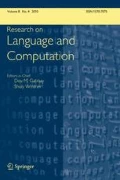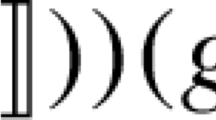Abstract
A direct representation of functional reference is proposed, such as occurs in “All graduates received a job offer (at the job fair); all of them accepted their offer”. The approach makes use of a variant of dynamic predicate logic wherein the values of existentially quantified variables may be functions. The approach also appears helpful with respect to some other problems in semantic representation, in particular bridging anaphora and generic or frame/script-like knowledge.
Similar content being viewed by others
References
Ahn, D. D. (2003). Presupposition incorporation in adverbial quantification. In Modeling and using context: Proceedings of CONTEXT 2003 (pp. 1–14) Stanford, CA.
Ahn, D. D. (2004). The role of situations and presuppositions in Restricting Adverbial quantification. Ph.D. thesis, Department of Computer Science, University of Rochester, Rochester, NY.
Baader, F., Calvanese, D., McGuinness, D., Nardi, D., & Patel-Schneider, P. (Eds.) (2003). The description Logic Handbook: Theory, Implementations, and Applications. Cambridge, England: Cambridge Universities Press.
Barker, C. (2001). Integrity: A syntactic constraint on quantificational scoping. In: K. Megerdoomian and L. A. Bar-el (Eds.): WCCFL 20. USC, p. 56–67, Cascadilla Press.
Carlson G., Pelletier F. (1995). The Generic Book. University of Chicago Press, Chicago
Chierchia G. (1995). Dynamics of Meaning. University of Chicago Press, Chicago
Dekker P. (2002). Pronouns in a pragmatic semantics. Journal of Pragmatics 34:815–827
Evans G. (1980). Pronouns. Linguistic Inquiry 11:337–362
Geurts B. (2002). Donkey business. Linguistics and Philosophy 25:129–156
Groenendijk J., Stokhof M. (1991). Dynamic predicate logic. Linguistics and Philosophy 14:39–100
Hardt, D. (2003). DRT and related theories, lecture IV: The E-type challenge. In ESSLLI 2003 Class Notes, 15th European Summer School in Logic Language and Information, Vienna University of Technology, Vienna, Austria.
Krifka M. (1996). Parameterized sum individuals for plural anaphora. Linguistics and Philosophy 19:555–598
Minsky, H. (1975). A framework for representing knowledge. In P. Winston (Ed.), The Psychology of Computer Vision. New York: McGraw-Hill, pp. 211–277.
Nouwen, R. (2003). Plural pronominal anaphora in context: Dynamic Aspects of Quantification. Ph.D. thesis, UiL-OTS, University of Utrecht.
Schank, R. & Abelson, R. (1977). Scripts, Plans, Goals and Understanding. Hillsdale, NJ: Lawrence Erlbaum Association.
Schlenker, P. (1999). In P. Tamanji (Ed.), Proceedings of the North-East Linguistics Society NELS 29. Amherst, MA.
Schlenker, P. (2004). Scopal independence: On branching & island-escaping readings of indefinites and disjunctions. Journal of Semantics (to appear).
Schubert, L. (1999). Dynamic Skolemization. In H. Bunt & R. Muskens (Eds.), Computing Meaning (vol. 1), pp. 219–253. Kluwer Academic Press.
Schubert, L. (2004). Variables as functions: Efficient reference to dependent entitie. In Workshop on Semantic Approaches to Binding Theory, 16th European Summer School in Logic, Language and Information (ESSLLI 2004), Universié Henri Poincaré, Nancy.
Steedman, M. (1999). Alternating quantifier scope in CCG. In Proceedings. of 37th Ann. Meeting of The Association for Computational Linguistics (ACL’99), College Park, MD, pp. 301–308.
Steedman, M. (2003). Scope Alternation and the Syntax-Semantics Interface. Informatics, University of Edinburgh.
van den Berg, M. H. (1993). Full dynamic plural logic. In K. Bimb’o, & A. M’at’e (Eds.), Proceedings of the 4th Symposium on Logic and anguage. Budapest.
van den Berg, M. H. (1996a). Discourse grammar and dynamic logic. In P. Dekker & M. Stokhof (Eds.), Proceedings of the Tenth Amsterdam Colloquium (pp. 93–112). Department of Philosophy: University of Amsterdam.
van den Berg, M. H. (1996b). The internal structure of discourse. Ph.D. thesis, ILLC, University of Amsterdam.
Wang, L., McCready, E., & Asher N. (2006). Information dependency in quatificational coordination. In K. Turner & K. von Heusinger (Eds.), Where Semantics Meets Pragmatics, Amsterdam: Elsevier.
Winter Y. (1997). Choice functions and the scopal semantics of indefinites. Linguistics and Philosophy 20:399–467
Author information
Authors and Affiliations
Corresponding author
About this article
Cite this article
Schubert, L. Implicit Skolemization: efficient reference to dependent entities. Research Language Computation 5, 69–86 (2007). https://doi.org/10.1007/s11168-006-9015-x
Received:
Accepted:
Published:
Issue Date:
DOI: https://doi.org/10.1007/s11168-006-9015-x




